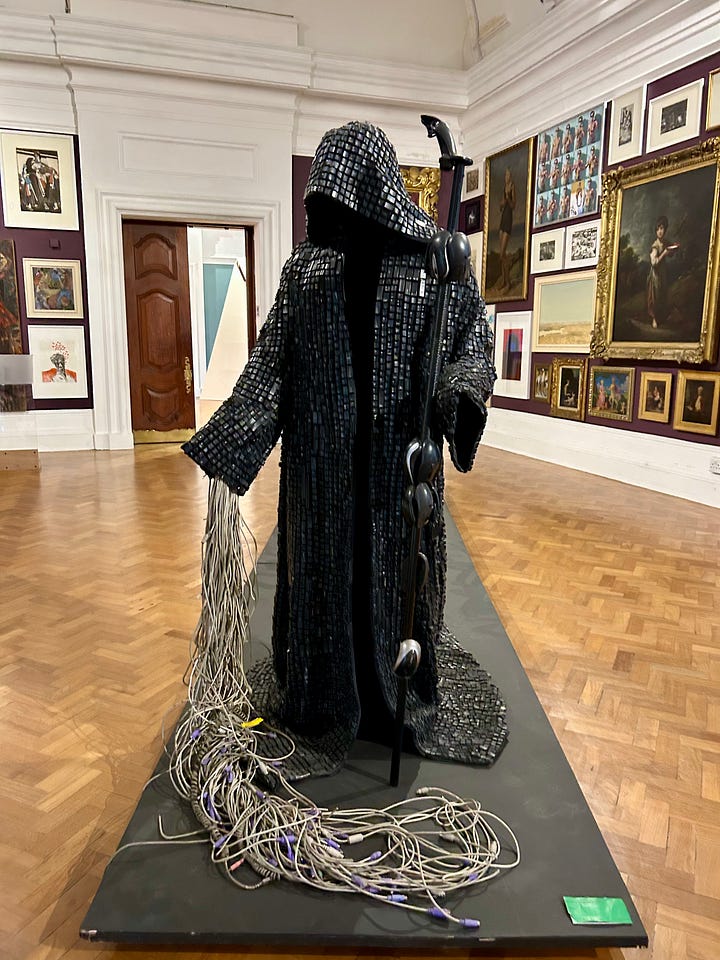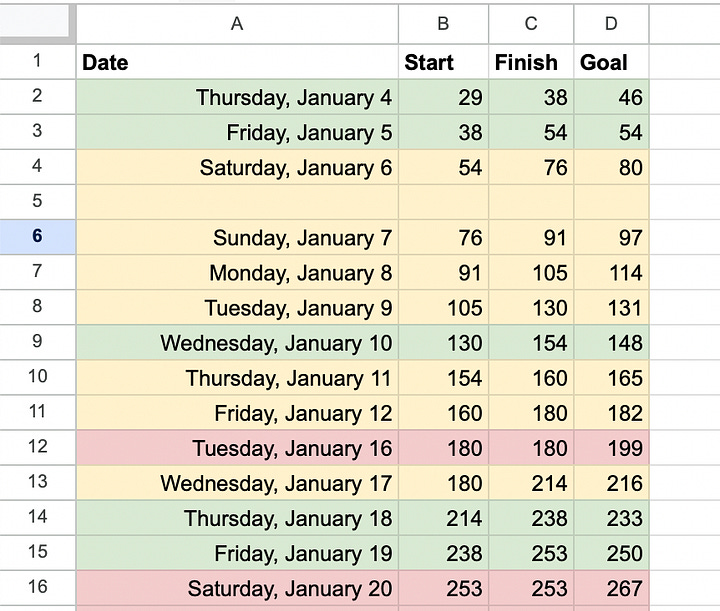Hello! I’m back from a week in South Africa, where Uber invited me to try out its new safari program (I’m serious). Here’s a clip of the 17 most majestic seconds of my life:
I wrote about the experience for Bustle. Other trip highlights: Taking in the view of Cape Town from 3,500 feet up a mountain (did I mention my fear of heights?), vineyard-hopping around Stellenbosch, and this Grim Reaper statue made of keyboards and mice at the South African National Gallery.




Doesn’t the statue kind of look the way writing sometimes feels?
I ran a poll about newsletter topics recently, and the majority of you voted that this installment should be a quick, simple, nifty guide to writing a novel, which is definitely something that I can teach in a single email. I will do my best! Because ideally, I want your writing process to feel giddy and delicious (bottom right photo), not haunting and daunting (bottom left).
But first, a few other things.
What I’m working on
Before my trip, I reviewed Maine Characters’ pass pages — in other words, the designed manuscript laid out like an actual book, not a Word document. It was my last chance to fiddle with the text.
I read it out loud, which is a good way to catch typos and hear what’s not working. I made hundreds of teeny-tiny tweaks. Most of it was tightening up dialogue, making it (hopefully) sound more natural.
I submitted the final, final, final copy (!!!) and next, it’ll go to production editors and proofreaders.
Some early feedback on Maine Characters
While I was away, the book hit NetGalley! It’s now available for request there. (Please note: I do not have any control over approvals.)
Somehow, it didn’t really hit me that people were actually going to start reading the book until I got my first DM from a bookstagrammer, and then it hit me. Little pieces of my heart and brain, floating around on random Kindles? This isn’t my first rodeo; I should be used to this by now. But it feels exciting and scary and fidgety and amazing all at once.
And! The book has been blurbed by some incredible writers, people I look up to and learn from. A few snippets:
“Poignant, funny, and impossible to put down… a perfect summer by a lake distilled into book form.” — Dana Schwartz, #1 New York Times bestselling author of Anatomy: A Love Story
“Hannah Orenstein writes wonderfully about family, and this novel makes me want to drop everything and move to Maine.” — Gary Shteyngart, New York Times bestselling author of Lake Success
“Hannah Orenstein is a gifted storyteller with a knack for revealing the innermost workings of the human heart.” — Camille Pagán, bestselling author of Good for You
“A decadent, sun-soaked novel that goes down like a crisp glass of Sancerre on a hot day. I absolutely drank it up." — Genevieve Wheeler, author of Adelaide
Plus, Becca Freeman wrote in her newsletter that you’ll like Maine Characters if you “love Elin Hilderbrand’s multi-POV dramas but wish there were more lobster rolls.” I can’t think of higher praise.
All right, shall we?
13 tips for writing a novel
Read everything. This is how you soak up what works — what character development looks like, how sub-plots all come together in the end, how to sneak in foreshadowing, etc. When you love something, try to figure out what makes it so great.
Need help brainstorming? What subject fascinates you? What kind of world (setting, industry, community) do you know well? What real-life experiences could you draw on? What would a mashup of your two favorite novels look like?
Just go for it. You don’t need to start with page one. Maybe it feels easier to jump into a whole brain dump of ideas, a character sketch, a random scene, an outline, or even a moodboard.
Write longhand. You knew I was going to say this, right? When you’re using a notebook and pen, you can’t open up Instagram in a new tab. You can’t labor over a sentence forever. For me, it’s the single best way to get into a flow.
Give yourself a deadline and hold yourself accountable. I started writing my first novel on May 15th and promised myself I’d be done by Halloween. I finished on October 27th. That definitely wouldn’t have happened without the pressure of a deadline.
What motivates you to keep working? I like meticulous spreadsheets and external validation, so I stay on track by logging my word count and (sometimes) posting these stats on Instagram. When I need an extra kick, I go wild with color-coding. (Below, green meant I hit that day’s goal, yellow meant I didn’t quite make it, and red meant things were bleak.) Maybe you bribe yourself — when I wanted to buy a nice ring, I made myself hold off until I finished the next draft of Maine Characters. Whatever works, right?


Conflict. When I was 12, I looked up tips for writing fiction and was so bummed to learn that my characters needed to have bad days. I just wanted to write about the fun stuff. But you know what? It’s fascinating to watch someone react to problems and navigate the tough stuff. Just like in life, the lows make the highs even sweeter.
Meet your new best friend: TK. Which is journalism lingo for “to come.” (Not TC because most journalism jargon is intentionally misspelled so that other people involved in the publishing process don’t think they’re words meant for publication.) When you don’t have certain info readily accessible, or you don’t want to get bogged down with details, use TK and keep going. For example, “They went to TK concert.” Maybe it was Sabrina Carpenter. Maybe it was Metallica. I don’t know yet! That’s fine.
Write in scenes. Rather than summarizing your characters are feeling or thinking, put them into action. Show, don’t tell. You don’t want descriptions floating in space; you want to ground your ideas in specific moments. I sometimes have a tendency toward summarization just because, well, it’s easier. But it’s not the most vivid way to tell a story. For example, in the draft I’m currently working on, I had a few paragraphs explaining that a friendship was getting strained. I redirected myself to illustrate that by dropping the characters into a party and showing a few instances of one rubbing the other the wrong way.
Don’t sweat the small stuff. I accidentally wrote that party scene in two different tenses. I have another character who’s gone by four names in 40,000 words because I haven’t found the right one yet. That’s okay! I can straighten things out later.
Don’t edit until the first draft is done. Don’t even worry about getting a scene or a paragraph or a single line “right.” Those are problems for future you. Right now, all you need to focus on is getting to the end.
Find a beta reader. Once you’ve completed a draft and polished it up a bit, it’s helpful to have someone take a look and offer feedback. Not sure who to ask? I have a Facebook group for fiction writers, and a lot of people find beta readers there.
I’m here to help! I have a few virtual, hour-long workshops, including one about how to write a novel and another on how to edit. Both get into nitty-gritty craft stuff, like how to structure your plot and write realistic-sounding dialogue. I also really enjoy one-on-one consulting calls where we can talk about your personal writing practice and projects. For more info on both, click here. I’d love to work with you!





I am such a pro-spreadsheet girly too! There’s such motivation in those little cells as you move chapter to chapter. Excellent tips!!
Saving these tips! I have heard TK before and didn’t know what it meant and will definitely be using it now, instead of just writing “maybe this? Maybe that?” constantly 😆